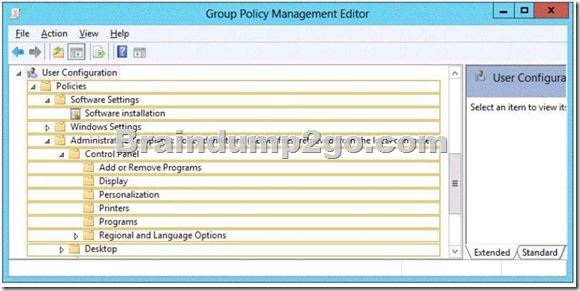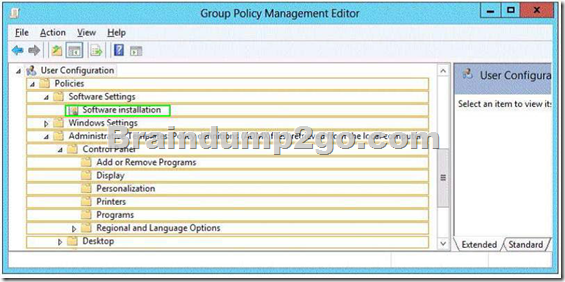Are You Interested in Successfully Completing the Microsoft 70-416 Certification Then Start to Earning Salary? Braindump2go has Leading Edge Developed Microsoft Exam Questions that will Ensure You Pass this 70-416 Certification! Braindump2go Delivers you the Most Accurate, Current and Latest Updated 70-416 Certification Exam Questions Availabe with a 100% Money Back Guarantee Promise!
Vendor: Microsoft
Exam Code: 70-416
Exam Name: Implementing Desktop Application Environments

QUESTION 81
Your network contains an Active Directory domain named contoso.com.
All servers run Windows Server 2012. All client computers run Windows 8.
The domain contains a Remote Desktop Services (RDS) infrastructure and a Microsoft Application Visualization (App-V) infrastructure.
Domain users use version 1.0 of a third-party application named Appl.
Version 2.0 of App1 is released.
Version 1.0 and version 2.0 cannot be installed on the same client computer.
You need to recommend a solution to ensure that the users can run both versions of App1 simultaneously.
The solution must meet the following requirements:
– Provide users with the ability to run App1 while they are disconnected from the corporate network.
– Minimize the amount of disk space required.
What should you include in the recommendation?
A. Use App-V to sequence and publish version 2.0 of Appl.
B. Publish version 2.0 of App1 as a RemoteApp program.
C. Create a shim for version 2.0 of App1 by using the Microsoft Application Compatibility
Toolkit (ACT).
D. Deploy version 2.0 of App1 on a virtual machine on the client computers.
Answer: A
QUESTION 82
Your network contains an Active Directory domain named contoso.com.
All client computers run Windows 8 Enterprise.
You plan to deploy Hyper-V to the client computers.
You need to identify which hardware features the client computers must support to enable the Client Hyper-V feature.
What should you identify? (Each correct answer presents part of the solution. Choose all that apply.)
A. Hardware-assisted virtualization
B. Hardware-enforced Data Execution Prevention (DEP)
C. Multipath I/O (MPIO)
D. Non-uniform memory access (NUMA)
E. Second Level Address Translation (SLAT)
Answer: ABE
QUESTION 83
You plan to deploy virtual desktops to the network.
All of the virtual desktops will be based on a virtual machine template named Templatel.vhd. Templatel.vhd contains an application named Appl.
You plan to deploy an update to App1 named Applupdate.msp.
You need to recommend the appropriate deployment method to apply Applupdate.msp to Templatel.vhd.
You want to achieve this goal by using the minimum amount of administrative effort.
Which deployment method should you recommend?
A. Run dism.exe and specify the /mount-w\rr\ parameter and the /add-package parameter.
B. Start a virtual machine that uses Templatel.vhd.
Install Applupdate.msp, and then generalize the virtual machine,
C. Mount Templatel.vhd, and then copy Applupdate.msp to the %Systemroot%\AppPatch folder.
D. Run diskpart.exe and specify the attach parameter.
Run msiexec.exe and specify the /update parameter.
Answer: B
QUESTION 84
Your network contains multiple servers that run Windows Server 2012.
The network contains a Windows Server Update Services (WSUS) infrastructure.
On a server named Server1, you create and deploy images by using Microsoft Deployment Toolkit (MDT) 2012.
You need to recommend a solution to ensure that the available updates are applied during the deployment of the image.
What should you do?
A. From the WSUS Administration console, configure the personalization settings, and then
create a computer group.
B. From Server1, edit the task sequence, and then modify the Customsettings.ini file.
C. From the WSUS Administration console, configure the personalization settings, and then
configure the classifications.
D. From Server1, edit the task sequence, and then modify the Bootstrap.ini file.
Answer: B
QUESTION 85
Your network contains an Active Directory domain named contoso.com.
You use a Group Policy object (GPO) named GP01 to deploy applications to the domain users. You need to create software categories that will be used to group the applications that are displayed in Programs and Features.
Which setting in GPO1 should you configure? To answer, select the appropriate node in Group Policy Management Editor in the answer area.

Answer:

QUESTION 86
Your network contains two servers named Server1 and Server2 that run Windows Server 2012. You need to install the Remote Desktop Services server role on Server2 remotely from Server1. Which tool should you use?
A. The dsadd.exe command
B. The Server Manager console
C. The Remote Desktop Gateway Manager console
D. The Install-RemoteAccess cmdlet
Answer: B
QUESTION 87
Your network contains a file server named Server1 that runs Windows Server 2012.
All client computers run Windows 8.
Server1 contains a folder named Folder1.
Folder1 contains the installation files for the company’s desktop applications.
A network technician shares Folder1 as Share 1.
You need to ensure that the share for Folder1 is not visible when users browse the network.
What should you do?
A. From the properties of Folder1, deny the List Folder Contents permission for the Everyone
group.
B. From the properties of Folder1, remove Share1, and then share Folder1 as Share1$.
C. From the properties of Folder1, configure the hidden attribute.
D. From the properties of Share1, configure access-based enumeration
Answer: B
QUESTION 88
You work as an administrator at L2P.com.
The L2P.com network consists of a single domain named L2P.com. All servers in the L2P.com domain, including domain controllers, have Windows Server 2012 installed.
You have been instructed to add a new domain controller to L2P.com’s existing environment.
Which of the following actions should you take?
A. You should consider making use of Server Manager.
B. You should consider making use of Authorization Manager.
C. You should consider making use of Remote Desktop Gateway Manager.
D. You should consider making use of Network Load Balancing Manager.
Answer: A
QUESTION 89
Your network contains an Active Directory domain named contoso.com.
The domain contains a server named Server1 that runs Windows Server 2012.
Server1 has the Hyper-V server role installed.
Server1 has a virtual switch named RDS Virtual.
You replace all of the network adapters on Server1 with new network adapters that support single-root I/O virtualization (SR-IOV).
You need to enable SR-IOV for all of the virtual machines on Server1.
Which two actions should you perform? (Each correct answer presents part of the solution. Choose two.)
A. On each virtual machine, modify the Advanced Features settings of the network adapter.
B. Modify the settings of the RDS Virtual virtual switch.
C. On each virtual machine, modify the BIOS settings.
D. Delete, and then recreate the RDS Virtual virtual switch.
E. On each virtual machine, modify the Hardware Acceleration settings of the network adapter.
Answer: DE
QUESTION 90
Your network contains an Active Directory domain named contoso.com.
The domain contains a main office and a branch office.
An Active Directory site exists for each office.
The domain contains two servers named Server1 and Server2 that run Windows Server 2012. Both servers have the DHCP Server server role installed.
Server1 is located in the main office site.
Server2 is located in the branch office site.
Server1 provides IPv4 addresses to the client computers in the main office site.
Server2 provides IPv4 addresses to the client computers in the branch office site.
You need to ensure that if either Server1 or Server2 are offline, the client computers can still obtain IPv4 addresses.
The solution must meet the following requirements:
– The storage location of the DHCP databases must not be a single point of failure.
– Server1 must provide IPv4 addresses to the client computers in the branch office site only if Server2 is offline.
– Server2 must provide IPv4 addresses to the client computers in the main office site only if Server1 is offline.
Which configuration should you use?
A. load sharing mode failover partners
B. a failover cluster
C. hot standby mode failover partners
D. a Network Load Balancing (NLB) cluster
Answer: C
Braindump2go New Published Exam Dumps: Microsoft 70-416 Practice Tests Questions, 93 Latest Questions and Answers from Official Exam Centre Guarantee You a 100% Pass! Free Download Instantly!
